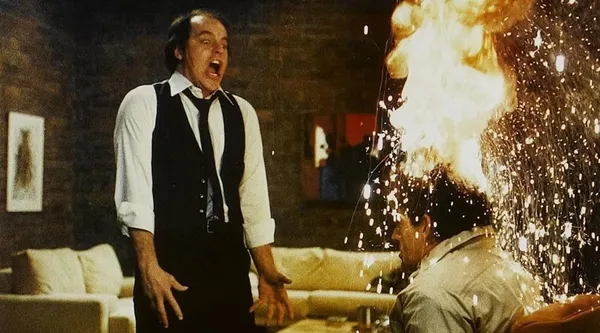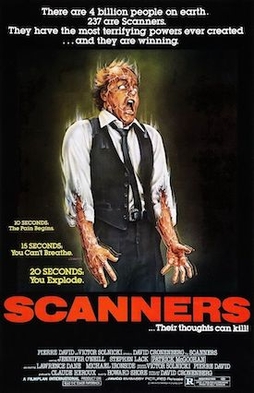Eye For Film >> Movies >> Scanners (1981) Film Review

In the aftermath of the Watergate scandal the US government decided to do a little house cleaning. By the late Seventies this had exposed numerous wrongdoings by the American military and political establishment. One programme in particular became infamous for its immoral, pseudo-scientific experiments in brainwashing and psychological torture: MKUltra. Since the early Seventies the Stanford Research Institute had been working with the CIA on remote viewing to close the supposed psychic warfare gap with the Soviet Union. By 1977 Defense Intelligence Agency and SRI had started up the Stargate Project. In the early Eighties members of special forces units were 'experimenting' in psychic assassination by staring at goats and hamsters. Before declassification much of what was going on was just in the purview of conspiracy theorists and quacks.
It was 1981 that David Cronenberg's Scanners landed in cinemas. It crossed the boundaries of science fiction, horror and cold war thriller.

The film starts with a kidnapping. A bigoted woman in a shopping mall food court falls foul of the destitute Cameron Vale's (Stephen Lack) psychic powers. This alerts his pursuers. Chased down across a glittering geometric mesh of escalators, shot with a tranquilliser and captured like an animal, something inhuman that's not supposed to be part of society. The interiors are important in this film: the mall with its clutter and sparkling light reflecting off brushed steel that Lack's character simply can't fit into; the ascetic, uncaring corporate offices full of hard lines; warm wooden soft-furnished rooms for the more sympathetic characters.
A disused factory with exposed brickwork greets Cameron Vale as he wakes, restrained, strapped to a gurney. He is not just physically helpless, his psychic powers are blunted by a drug: Ephemerol. It is here that Dr. Ruth (Patrick McGoohan), who runs the scanner research program at ConSec, explains something of what is going on to Cameron.
Meanwhile in a crisp clean lecture hall with bright red seating, ConSec are about to make an announcement to select members of the military industrial complex. It is going to be about the weaponisation of scanners. Darryl Revok (Michael Ironside) volunteers to be scanned as part of a demonstration. Unknown to ConSec, Revok is a scanner. In a scene that is famous in horror cinema, he fries the brain of the man trying to scan him, causing his head to explode. ConSec need to do something about Revok but the only asset they have is Cameron Vale. In a bloody and violent thriller he follows trail of breadcrumbs to an ending that is conceptually and viscerally horrific.
The concept, narrative, dialogue, cinematography and action sequences are elements of Scanners that can't be faulted. The special effects mostly hold up to modern eyes but some of them can look a little cheesy. However the film suffers from imbalanced performances by the actors. Patrick McGoohan, Lawrence Dane as Braedon Keller, ConSec's head of security, and Robert A Silverman as Benjamin Pierce, scanner and sculptor, all give good performances. Jennifer O'Neill as Kim Obrist, Vale's companion, is more than adequate. Stephen Lack's acting range is somewhat limited. Against the aforementioned cast, that is a problem that a director like David Cronenberg can get around. The issue is when it is counterpointed with the performance of the antagonist by Michael Ironside. This is Ironside's breakthrough performance. It will guarantee him work in the decades to come. It isn't just that he plays Revok so well, it's that he plays Cameron Vale better than Stephen Lack does.
From the green terminal-like font of the opening credits to the glowing phosphors of the end, Scanners has a gripping narrative full of action and intrigue. At a deeper level its themes remain prescient. The movers and shakers in the delusional psychic warfare programmes of the Seventies and Eighties became the movers and shakers in the enhanced interrogation programmes of the war on terror. Abu Ghraib and Guantanamo are theirs. Some, like major general Albert Stubblebine, ended up deep in the alt right.
Reviewed on: 29 Mar 2025
















